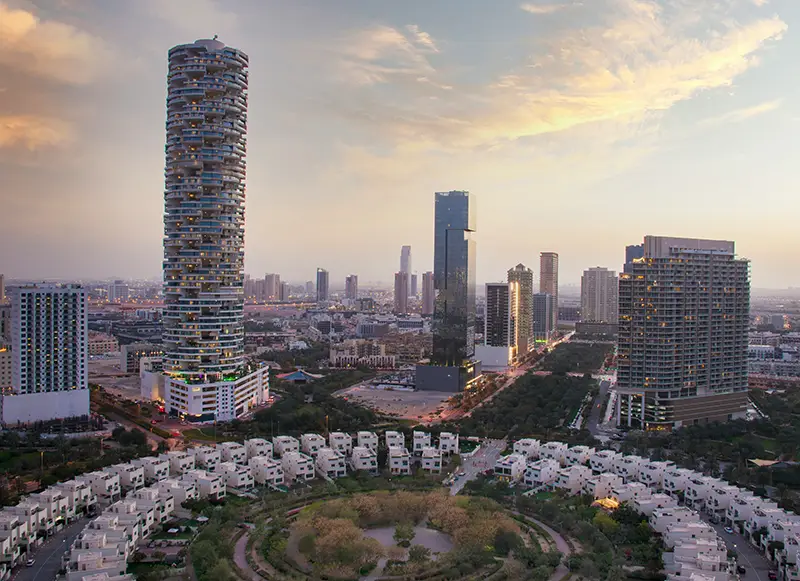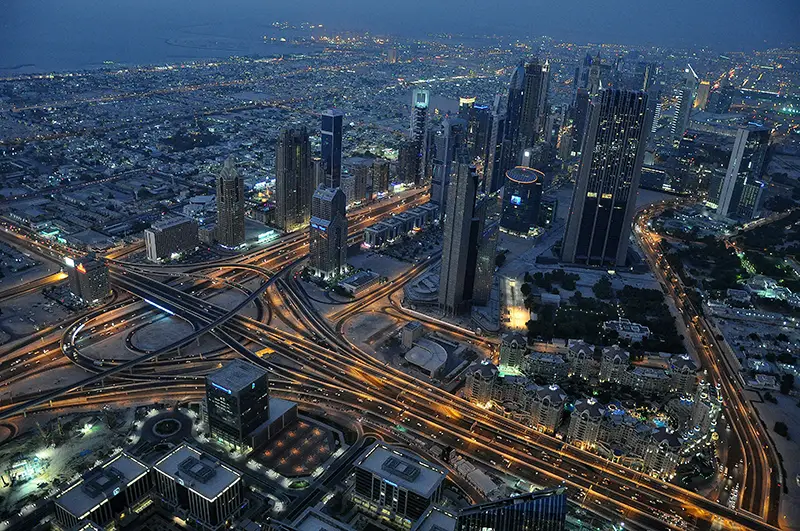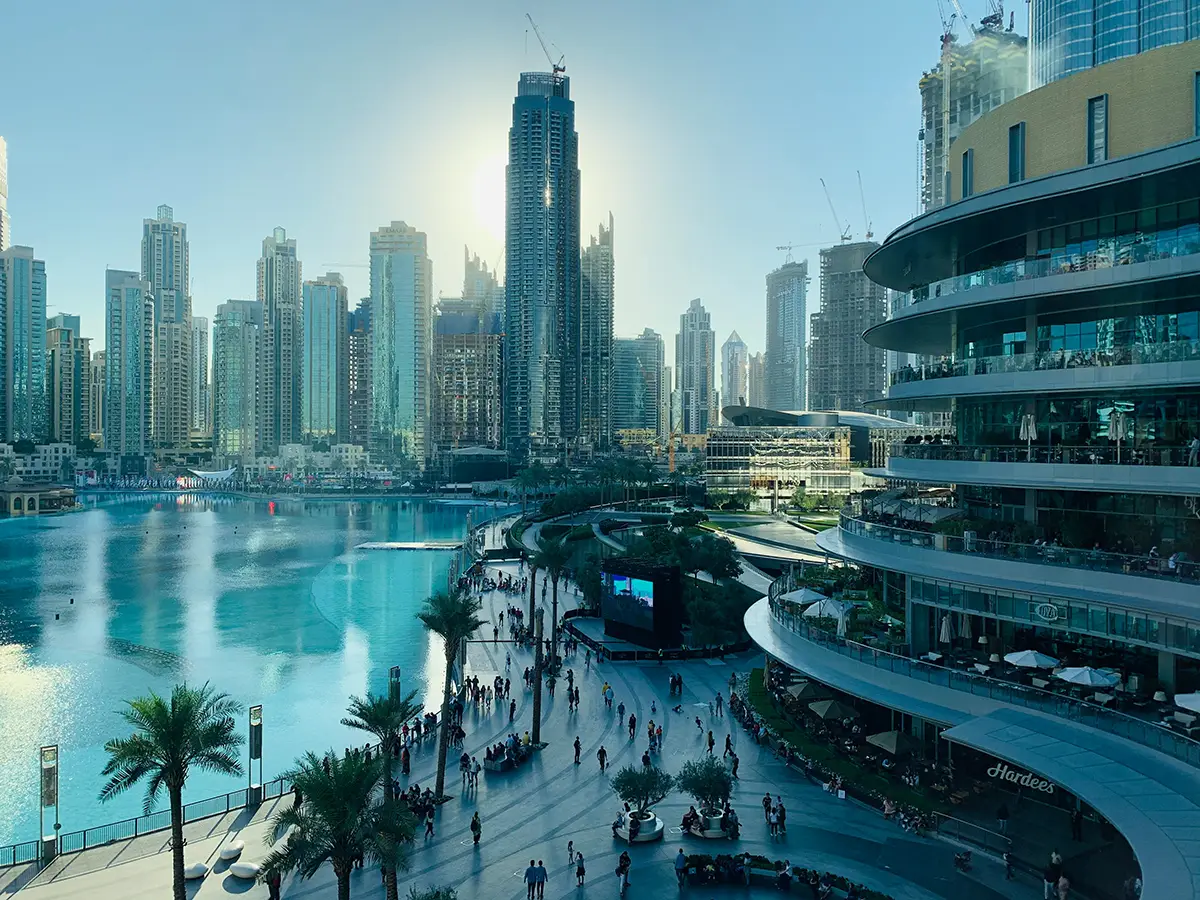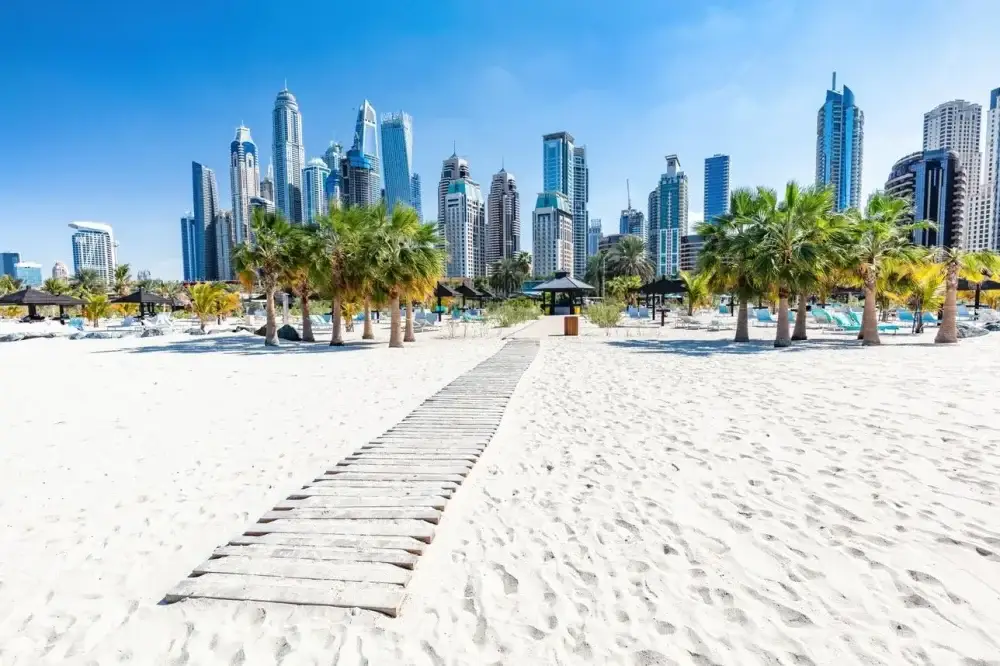Dubai’s property market has boomed in recent years due to a combination of favourable conditions for foreigners and rapidly developing infrastructure. Investing in housing here can bring tangible profits thanks to rising prices and rental demand. But how to buy a flat in Dubai correctly to avoid mistakes? In this article, we will look at all the nuances – from the choice of neighbourhood to legal aspects, so that every detail of the process becomes clear.

How to choose the best neighbourhood to successfully buy a flat in Dubai
A city of contrasts: here skyscrapers and modern technology combine with traditional neighbourhoods and cosy green areas. When choosing a neighbourhood to buy a flat in Dubai, it is important to consider what you expect from your new home: a high level of luxury, accessibility to transport infrastructure or peace and privacy.
Downtown Dubai: the heart of the city
A real calling card of the city. The famous Burj Khalifa, the largest shopping centre The Dubai Mall and dancing fountains are located here. Flats in this area are more expensive, the average price per square metre is about 25,000 AED. However, the advantages are obvious: incredible views, rich infrastructure and prestigious status.
Dubai Marina: for lovers of the sea
If you dream of buying a flat in Dubai with a sea view, Dubai Marina is the ideal choice. The average price for an object is about 18,000 AED per square metre. The neighbourhood is known for its promenades, many restaurants and active nightlife. It is ideal for those who appreciate a high level of comfort and an active lifestyle.
Jumeirah Village Circle: family friendly
For those looking for peace and cosiness, Jumeirah Village Circle (JVC) is a great solution. The average price of a flat is about 12,000 AED per square metre. There are parks, schools and entertainment areas for children, making JVC popular with families.
Features of living in popular neighbourhoods in Dubai
Each part of the city offers unique benefits, and the choice depends on personal preference:
- Downtown Dubai: ideal for those who want to be at the centre of the action and enjoy the best views of the city.
- Dubai Marina: suitable for lovers of the sea and active nightlife.
- Jumeirah Village Circle: great for families, thanks to its child-friendly infrastructure and quietness.
The options are so varied that everyone will find something here for themselves.
Flat prices in Dubai: what does the cost depend on?
 The cost of property depends on many factors: neighbourhood, type of building, view from the window, infrastructure nearby. For example, in prestigious parts of the city, such as Downtown or Dubai Marina, prices are higher due to proximity to major attractions and status. In less popular neighbourhoods such as JVC, the cost will be lower, making them a good option for those looking for comfort at a reasonable price.
The cost of property depends on many factors: neighbourhood, type of building, view from the window, infrastructure nearby. For example, in prestigious parts of the city, such as Downtown or Dubai Marina, prices are higher due to proximity to major attractions and status. In less popular neighbourhoods such as JVC, the cost will be lower, making them a good option for those looking for comfort at a reasonable price.
Legal aspects: how to buy a flat in Dubai safely
The process of buying property in Dubai for foreigners is as simplified as possible. However, there are a few important points to bear in mind in order to complete the transaction legally.
Step-by-step buying process:
- Property selection: find a flat that interests you and negotiate a price with the seller.
- Pre-contract: enter into a letter of intent, also known as a Memorandum of Understanding (MOU).
- Payment of a deposit: usually 10% of the price of the flat.
- Document verification: checking the seller’s and the property’s documents is an important step. At this step, it is advisable to contact a real estate agency in Dubai for professional assistance.
- Registration of the deal: Once the deal is finalised, it needs to be registered with the Dubai Land Department (DLD).
In order to finalise the purchase of a property in Dubai, you will need the following documents:
- Buyer’s Passport.
- Signed Memorandum of Understanding (MOU).
- Copy of visa (if available).
- Proof of funds or mortgage agreement.
These documents will help to pass all stages of the transaction without any problems and formalise the ownership of the flat.
Property taxes in Dubai
There is no personal income tax in the city, which makes it attractive for investors. However, when buying a property, there is a registration fee of 4% of the value of the dwelling, which must be paid to the Dubai Land Department. This is a mandatory tax that simplifies the registration process and makes it transparent.
Financing the purchase: mortgages and investments
Financing the purchase of a flat in Dubai can be done either with your own funds or with the help of a mortgage. Local banks offer mortgage loans for up to 25 years with a down payment of 20% for residents and 25% for non-residents.
Property mortgages in Dubai: what you need to know?
In order to apply for a mortgage loan, you will need:
- Passport and proof of income.
- Credit History.
- Confirmation of down payment.
Mortgage interest rates range from 3% to 5% per annum depending on the bank and the terms of the loan. Before signing the agreement, it is important to study all the terms and conditions and, if necessary, consult a financial advisor.
Is it worth investing in housing in Dubai?
The average rental yield here is 6-8% per annum, which is significantly higher than in many other cities. In addition, the Dubai government actively supports investors by offering residence permits for buyers of property priced from 750,000 AED.

Conclusion
 Buying residential property in the city of contrasts is a profitable investment that combines a high level of comfort, prestige and prospects for growth in the value of the object. In order to buy a flat in Dubai and do it safely, it is important to follow a step-by-step process, take into account legal aspects and choose the neighbourhood carefully. The city offers unique opportunities for living and investment.
Buying residential property in the city of contrasts is a profitable investment that combines a high level of comfort, prestige and prospects for growth in the value of the object. In order to buy a flat in Dubai and do it safely, it is important to follow a step-by-step process, take into account legal aspects and choose the neighbourhood carefully. The city offers unique opportunities for living and investment.
 en
en  de
de  ar
ar  es
es  hi
hi  fr
fr  nl
nl  it
it  pt
pt  el
el 









